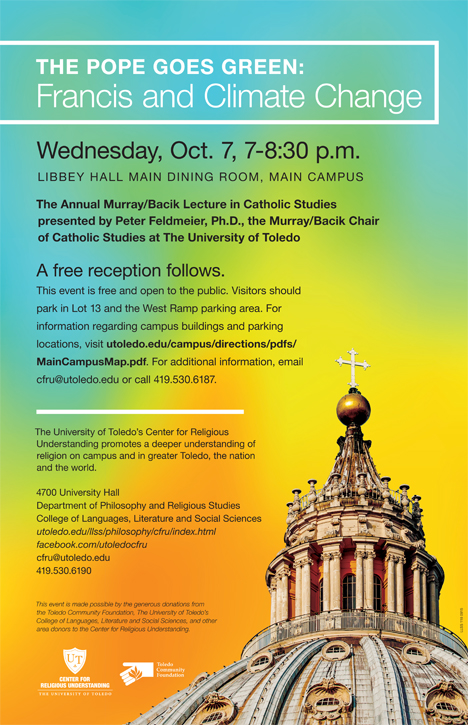The leader of the Catholic Church has made waves in his first two and half years in the papal office, tackling a number of hot-button issues. Arguably the biggest: climate change.
Dr. Peter Feldmeier, the UT Thomas and Margaret Murray and James J. Bacik Catholic Studies Professor, will present, “The Pope Goes Green: Francis and Climate Change,” at the annual Murray Bacik Lecture Wednesday, Oct. 7, at 7 p.m. in the Libbey Hall Dining Room. A reception will follow the free, public event.
 “Francis addresses a number of what he sees as interrelated issues, including pollution, the degradation of the planet, the culture of consumerism, poverty, marginalization of those most vulnerable to climate change, and climate change itself,” Feldmeier said. “He sees them all as a piece. He also sees far too little action, even as these issues, particularly climate change, demand immediate attention.
“Francis addresses a number of what he sees as interrelated issues, including pollution, the degradation of the planet, the culture of consumerism, poverty, marginalization of those most vulnerable to climate change, and climate change itself,” Feldmeier said. “He sees them all as a piece. He also sees far too little action, even as these issues, particularly climate change, demand immediate attention.
“The damage that climate change will bring in this and the next century is already decisive, but he believes that the human race can still come together to limit that future damage. Francis also believes that the created world and the sentient beings in it exist on their own right and not merely as objects of human utility. His vision is an inclusive one where love of God, love of neighbor, and love of the created world all mutually implicate each other.”
Pope Francis believes this is the most imperative moral concern of the day, which is why Feldmeier feels it’s an important topic to discuss.
Yet many people frown upon the pope speaking out about such issues, including Arizona Rep. Paul Gosar, who recently boycotted the pope’s address in Congress because of his views on climate change.
Feldmeier response to the critics: “Some leaders, particularly Republican leaders, who resist either accepting climate change or show no interest in addressing it have criticized Francis for venturing into realms he has no right to proclaim expertise. But I think this is a false move. Climate change has been known for decades and has international consensus among scientists. One cannot legitimately reject it.”
He likened it to a cancer patient who has 99 doctors telling him he has the disease and one doctor who said he doesn’t.
“That person is going to not only concede the cancer diagnosis, but also recognize that it is imperative to respond to it vigorously. In the same way, when the scientific community declares with massive consensus that climate change is a fact, the non-scientific community has an intellectual and moral duty to accept this.
“And given that climate change demands an aggressive response, it is morally necessary to do so. Human lives are at stake, the lives of thousands of species who will become extinct because of human-created climate change, and the future of our civilization and planet is at stake. If the pope is a moral leader, what greater moral imperative is there?”
For more information on the lecture, contact the Center for Religious Understanding at 419.530.6187 or visit utoledo.edu/llss/philosophy/cfru/events.html.